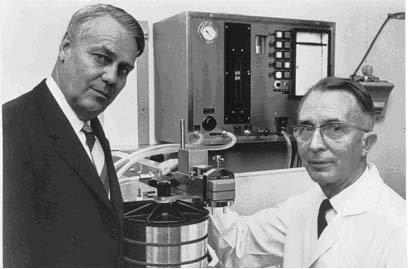
Holger Crafoord and Nils Alwall in front of the first Gambro kidney (Photo belongs to Lund University, Sweden).
Our heritage goes back to professor Nils Alwall, nephrology chair at Lund University, and one of the founding fathers of dialysis who inspired the creation of Gambro Inc, one of the major dialysis equipment manufacturers for many decades.
Diaverum's origin started with the founding of Gambro Healthcare division and the opening of the first dialysis clinic in Sweden, Lund, in 1991. From Sweden, Gambro healthcare clinics expanded to the rest of the world, and by the end of 2007, it operated 170 clinics in 14 countries, treating more than 14,000 renal patients.
In 2007, Gambro Healthcare was acquired by Bridgepoint with the vision to help healthcare systems across the world to provide universal access to world-class renal care and deliver life enhancing renal care to patients globally. Together with the new vision, the name Diaverum was adopted and launched worldwide.
During the following years, Diaverum has become a reference of world-class, personalised care provision, patient-centric digital innovations, and culture of True care, while expanding substantially worldwide. Today Diaverum operates 450 clinics in 24 countries serving more than 40,000 patients globally.
Important milestones in our history
Below are important milestones and events of Diaverum’s history of growth.
1991
Gambro opens its first dialysis clinic in Sweden, Lund.
2007
Bridgepoint acquires Gambro Healthcare from EQT and Investor AB, subsequently changing company name to Diaverum. The business is at the time the second largest corporate provider of dialysis care services in Europe with 155 clinics in 14 countries serving 12,000 patients and with ancillary businesses in South America and Australia.
2009
Diaverum enters Germany with three acquisitions of seven clinics in Kleve, Erkelenz and Potsdam.
2011
Diaverum enters Saudi Arabia in a joint venture with Nazer Group and initially establishes one greenfield clinic in Dammam. Diaverum enters Chile with the acquisition of four clinics. Diaverum enters Romania and adds nine clinics across the country.
2013
Diaverum Germany expands, adding four new clinics in Hamburg, one of them being one of the largest dialysis clinics in Europe.
2014
Diaverum wins 50% of outsourced dialysis services contract with Ministry of Health Saudi Arabia to care for more than 5,000 patients. Diaverum enters Russia by acquiring ten clinics of Unona, mainly located in the Sverdlovsk region.
2015
Diaverum enters the Asian market through its acquisition of Nefros Asia in Kazakhstan with nine kidney centres across the country.
2016
Diaverum acquires International Healthcare Systems (IHS) in Romania and adds 15 new clinics to the network.
2018
Diaverum opens state of the art transplant center d.INSTITUTE ITAC for complex transplants in Argentina. Diaverum enters Brazil and North Macedonia.
2019
Diaverum enters Albania, and enters Morocco through a partnership with Centre d’Hémodialyse de Marrakech, expanding Diaverum’s presence to 22 countries worldwide. Diaverum strengthens its presence in the Middle East with renewal of its five-year dialysis contract in Saudi Arabia. Diaverum serves more than 39,000 patients in more than 400 clinics across the globe excluding the US.
2020
Diaverum operates 4 clinics in China.
Diaverum in numbers
Clinics around the world
Globally present in 24 countries across four continents
Staff worldwide (approx.)
Patients (approx.)
Million treatments annually (approx.)